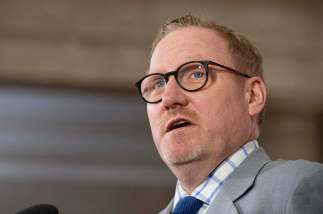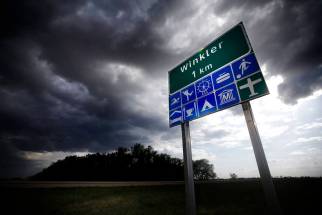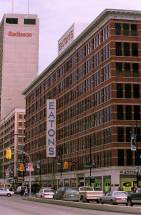Reconciliation work tops mayor’s year-end list
Read this article for free:
or
Already have an account? Log in here »
To continue reading, please subscribe:
Monthly Digital Subscription
$0 for the first 4 weeks*
- Enjoy unlimited reading on winnipegfreepress.com
- Read the E-Edition, our digital replica newspaper
- Access News Break, our award-winning app
- Play interactive puzzles
*No charge for 4 weeks then price increases to the regular rate of $19.00 plus GST every four weeks. Offer available to new and qualified returning subscribers only. Cancel any time.
Monthly Digital Subscription
$4.75/week*
- Enjoy unlimited reading on winnipegfreepress.com
- Read the E-Edition, our digital replica newspaper
- Access News Break, our award-winning app
- Play interactive puzzles
*Billed as $19 plus GST every four weeks. Cancel any time.
To continue reading, please subscribe:
Add Free Press access to your Brandon Sun subscription for only an additional
$1 for the first 4 weeks*
*Your next subscription payment will increase by $1.00 and you will be charged $16.99 plus GST for four weeks. After four weeks, your payment will increase to $23.99 plus GST every four weeks.
Read unlimited articles for free today:
or
Already have an account? Log in here »
Hey there, time traveller!
This article was published 21/12/2021 (1447 days ago), so information in it may no longer be current.
After nearly two terms as Winnipeg’s mayor, Brian Bowman ranks his efforts to promote human rights and further reconciliation as among his greatest achievements.
During a wide-ranging, year-end interview with the Free Press, Bowman credited the creation of the city’s Indigenous Accord, council’s human rights committee, and the Welcoming Winnipeg: Reconciling our History initiative as key steps toward a more unified community.
“I think we are having much more honest discussions in our city about the importance of reconciliation and protecting and defending human rights… I think we’re really on that journey of reconciliation now,” said Bowman, who has announced he will not seek re-election in October 2022.
The Welcoming Winnipeg initiative handles renaming requests for places and historical markers, with the goal of addressing names that negatively impact the Indigenous community. The issue attracted growing interest this year, after the discovery of more than 1,300 potential unmarked graves at former residential school sites across Canada sparked outrage.
The mayor says his recent proposal — that the city spend up to $100,000 to help fund legal challenges against Quebec’s controversial Bill 21 — if council approves next month, would continue the fight to protect human rights.
“I think we are having much more honest discussions in our city about the importance of reconciliation and protecting and defending human rights… I think we’re really on that journey of reconciliation now.”
– Brian Bowman
“It’s a pretty objectionable bill, and we’re now seeing the results of it in real life. Having children deprived of their school teacher as a result of state-sanctioned discrimination is not something that we should, as Canadians, stand idly by,” said Bowman.
Bill 21 bans some Quebec public civil servants from wearing religious garments at work, including teachers, police officers and judges. The law was cast into the spotlight again this month, when an elementary school teacher in Chelsea, Que., was transferred out of her classroom position because she wears a hijab.
While critics question the call to devote municipal dollars to fight a law in another province as the city struggles to pay its own bills, the Winnipeg mayor said the overall response to the idea has been “overwhelmingly positive.”
When asked if his next job will focus on human rights or reconciliation, Bowman, a lawyer, stressed he has yet to make any decisions on that front.
“I’m just starting to get folks reaching out with different opportunities, so I’m starting to have those discussions … When we get into the new year, I’ll start making some decisions.”
While the mayor takes pride in his efforts to combat racism, he admits there’s been no shortage of challenges during his time leading city council, as the global COVID-19 pandemic rages on.
“It’s a pretty objectionable bill, and we’re now seeing the results of it in real life. Having children deprived of their school teacher as a result of state-sanctioned discrimination is not something that we should, as Canadians, stand idly by.”
– Brian Bowman on his proposal for the city to spend up to $100,000 to help fund legal challenges against Quebec’s controversial Bill 21
Bowman said the apparent lack of progress in reducing the number of Winnipeggers experiencing homelessness over the past seven years — something governments and End Homelessness Winnipeg have launched several initiatives to support — is one of his greatest disappointments.
“That is something that has really troubled me,” he said.
Bowman urged senior governments to step up with additional funds to support affordable housing, health care and social services to help combat homelessness, arguing the City of Winnipeg simply can’t afford to make all of those investments alone.
“We (will provide) up to $2 million in additional supports (in 2022) to try to help, but there is a limit to municipal property taxpayers’ ability to fix problems that are in other levels of governments’ jurisdiction,” he said.
While critics may deem the failure to boost the tight city budget through a real estate development impact fee as a major political blow for the mayor, Bowman disagrees. There are no current plans to add another version of the levy but he still won’t rule out revisiting the idea during his final months as mayor.
“Whether this year or in future years, that road map is there and the stage is set (to debate that),” he said.
The city began charging impact fees on new homes in some new neighbourhoods in May 2017. A judge later deemed it an “invalid indirect tax” and ordered the city to refund the fees it had put aside.
However, the mayor stressed the legal decision left the door open to impose a different type of impact fee in the future.
“For years, I heard it couldn’t be done by some. We now have a court decision saying, in fact, we do have the legal ability to do so.”
joyanne.pursaga@freepress.mb.ca
Twitter: @joyanne_pursaga

Born and raised in Winnipeg, Joyanne loves to tell the stories of this city, especially when politics is involved. Joyanne became the city hall reporter for the Winnipeg Free Press in early 2020.
Our newsroom depends on a growing audience of readers to power our journalism. If you are not a paid reader, please consider becoming a subscriber.
Our newsroom depends on its audience of readers to power our journalism. Thank you for your support.






